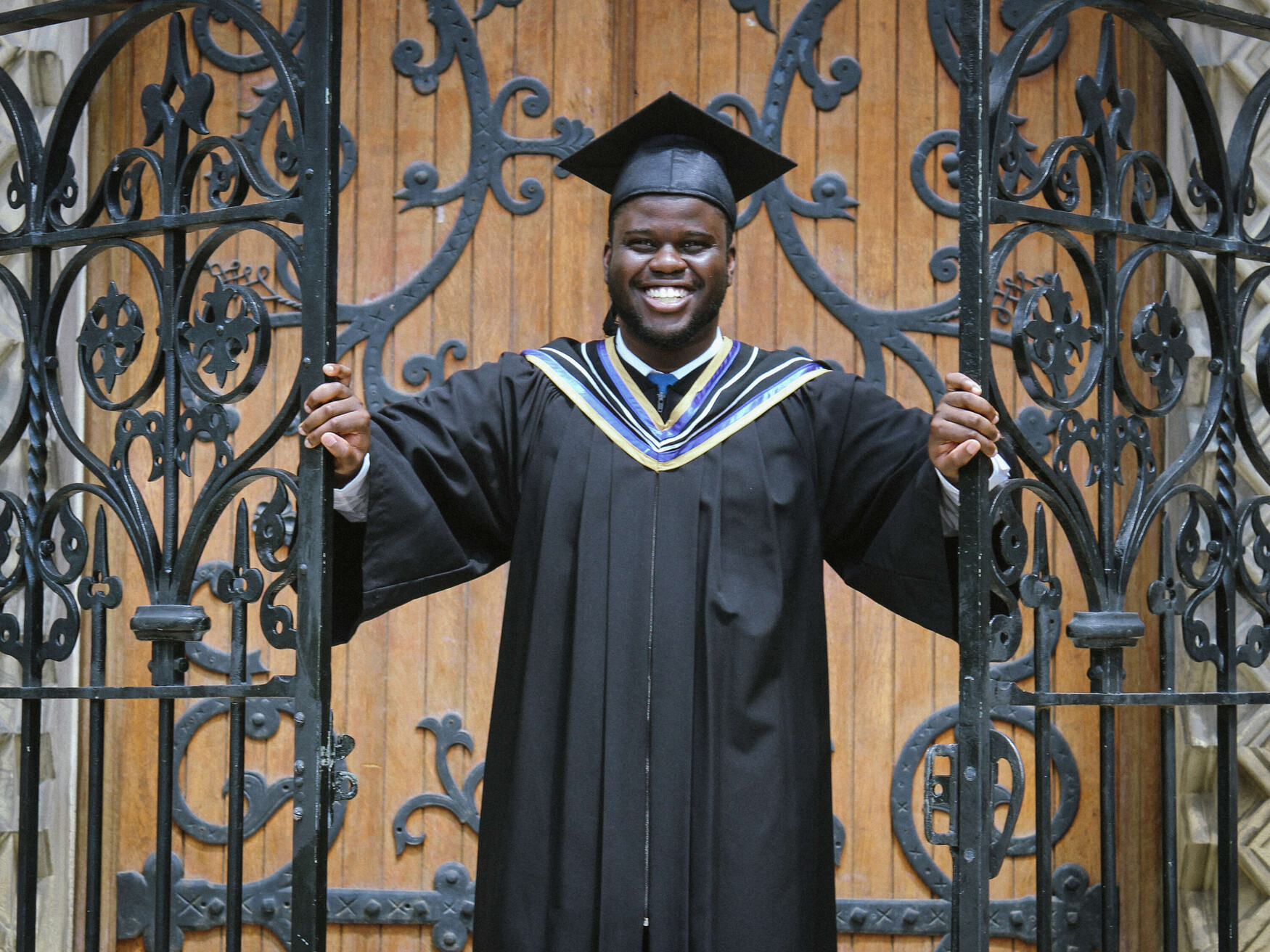Mobile Menu
- Education
- Research
-
Students
- High School Outreach
- Undergraduate & Beyond: Community of Support
- Current Students
- Faculty & Staff
- Alumni
- News & Events
- Giving
- About

When Mfon Udoh-Orok addressed his fellow Master of Health Science (MHSc) in Medical Genomics graduates during his valedictory speech, he reflected on the role of genetics in understanding and combatting the COVID-19 pandemic.
The first cases of the novel coronavirus were observed in December 2019. By January 2020, the virus’ genetic sequence was made publicly available.
A few months later, COVID tests created using genetic techniques became widely used around the world.
A year later, vaccines that use genetic principles are now beginning to help bring the pandemic under control.
To Udoh-Orok, these developments are reminders of the critical role skilled geneticists like himself, and his classmates will play in the future at the bench and bedside.
The two-year, course-based professional program is the first-of-its kind in Canada. The program prepares learners to generate, integrate and interpret genetic and genomic data and work at the intersection of clinical practice and genomics research.
Udoh-Orok is part of the program’s second graduating class. He was also chosen by his class of 2021 peers to be the program’s inaugural valedictorian.
Udoh-Orok spoke with writer Erin Howe about the honour and what’s next for him.
How did you react when you learned you’d been chosen by your classmates to be the first MedGen valedictorian?
I was beyond surprised and felt super honored. My classmates are doing incredible research, and any of them could have been valedictorian. So, the fact that they chose me is humbling.
What sparked your interest in medical genomics?
I've been interested in the human body and biology since I was a young kid. When I took my first genetics course during my undergraduate degree, it was like a lightbulb went on and I knew it was something I wanted to pursue further. To me, genetics is a foundational aspect of all elements of biology.
Now that you’ve completed your master's degree, what are you up to these days?
I've already begun working full time as a bioinformatician at the Clinical Genomics Center at Mount Sinai, under Dr. Katherine Siminovitch.
Through my job, I get to do a variety of different things, including work on internal projects and for external clients. I also get to examine different kinds of samples, including human samples or Drosophila (better known as fruit flies), to investigate the genetic cause of certain diseases or phenotypes. As well, I facilitate the overall sequencing analysis to ensure the quality of the data and interpret the results.
I’d also like to continue my education, whether that's in the form of deepening my knowledge of genetics or computer science or even venturing into what I can do in the medical field. All those doors, I think, are just waiting to be opened for me.
How exciting is it to launch a career in medical genomics right now?
I mentioned this in my in my valedictory address. We're entering a realm where there’s not always a best practice or an instruction manual. Sometimes, we must use our ingenuity and creativity to push forward.
We're starting to get there in some areas of genetics, like with the more standardized variant interpretation pipelines and we have some best practices being adopted by different groups. But in other areas, where we may be looking for something different, like a unique type of variant, things are less established and we need to figure it out, research and try new things.
We're trying to implement new technologies, like trying to see if we can use AI to help facilitate discovery. It's really a field where if you have something that you think is a cool idea, you can really try for it. I love that aspect of it.
Have you had any important mentors throughout your educational journey?
I have to give credit to the three heads of the program, Profs. Erin Styles, Johanna Carroll and Martina Steiner not only because they were our educational stewards, but they also gave us any support we needed. If we were feeling anxious about an upcoming job interview or whatnot, they were always there to reassure and guide us.
I also want to give a special shout out to Prof. Gary Bader, a teacher in the bioinformatics portion early on in the program. He’s the person who helped me through that section and really helped me branch out and land my first position in the field. He's passionate about teaching and about what he does, and I sort of fed off that.
Prof. Neal Sondheimer, who specializes in metabolic genetics, also helped cement my desire to pursue further understanding of genetics.
Lu Yiqing, a teacher’s assistant in my third year of undergrad, also helped inspire me and motivated me not to give up. I’m a happy camper working at a computer and not much of a lab person. Yiqing’s support and encouragement at the bench really helped me through.